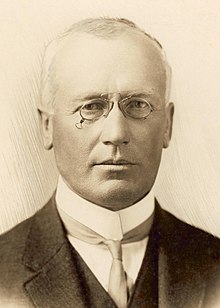William Irvine (Australian politician)
Sir William Irvine | |
|---|---|
 | |
| Chief Justice of Victoria | |
| In office 9 April 1918 – 30 September 1935 | |
| Preceded by | John Madden |
| Succeeded by | Frederick Mann |
| Attorney-General of Australia | |
| In office 24 June 1913 – 17 September 1914 | |
| Prime Minister | Joseph Cook |
| Preceded by | Billy Hughes |
| Succeeded by | Billy Hughes |
| Premier of Victoria | |
| In office 10 June 1902 – 16 February 1904 | |
| Governor | George Clarke Reginald Talbot |
| Preceded by | Alexander Peacock |
| Succeeded by | Thomas Bent |
| Member of the Australian Parliament for Division of Flinders | |
| In office 12 December 1906 – 5 April 1918 | |
| Preceded by | James Gibb |
| Succeeded by | Stanley Bruce |
| Personal details | |
| Born | 6 July 1858 Toorak, Victoria, Australia |
| Political party | Liberal (federal) |
| Spouse |
Agnes Wanliss (m. 1891) |
| Relations | Trinity College, Dublin .University of Melbourne |
| Profession | Barrister |
Sir William Hill Irvine
Irvine was born in
At the 1906 federal election, Irvine was elected to the seat of Flinders. He served as attorney-general in the Liberal government of Joseph Cook from 1913 to 1914, and during World War I was an advocate of conscription and leading campaigner in the 1916 referendum on overseas conscription. Irvine resigned from federal parliament in 1918 to become chief justice of Victoria. He served on the court until 1935 and as lieutenant-governor also served as acting governor of Victoria for nearly three years during the Great Depression.
Early life
Irvine was born on 6 July 1858 at Dromalane near
Irvine was raised in a
After arriving in Australia, Irvine settled in
Victorian politics
In 1894, Irvine was elected to the Victorian Legislative Assembly as a Liberal. He was Attorney-General 1899–1900 and 1902–03, and Solicitor-General in 1903. He succeeded George Turner as leader of the Victorian Liberals, but was much more conservative than either Turner or the federal Protectionist Party leader, Alfred Deakin. In 1902, supported by the National Citizens' Reform League, he displaced the more liberal Alexander Peacock and became Premier and Treasurer. He held office until 1904, when he was succeeded by the similarly-minded Thomas Bent.
Irvine's ministry was appointed on 10 June 1902:[2]
- Attorney-General: William Irvine
- Treasurer : William Shiels
- Solicitor-General : John Mark Davies
- Minister of Railways : Thomas Bent
- Minister of Education and Health : Robert Reid
- Minister of Public Works and Agriculture : John Taverner
- President of Board of Lands : Malcolm McKenzie
- Minister of Mines : Ewen Cameron
- Chief Secretary and Minister of Labour : John Murray
Federal politics
In 1906, Irvine was elected to the
Judicial career
Recognising that he was unlikely to progress further in politics, Irvine accepted appointment as the
Personal life
In 1891, Irvine married Agnes Somerville Wanliss, the daughter of colonial MP
Irvine was knighted
See also
- List of Judges of the Supreme Court of Victoria
References
Sources
- Geoff Browne, A Biographical Register of the Victorian Parliament, 1900–84, Government Printer, Melbourne, 1985
- Don Garden, Victoria: A History, Thomas Nelson, Melbourne, 1984
- Kathleen Thompson and Geoffrey Serle, A Biographical Register of the Victorian Parliament, 1856–1900, Australian National University Press, Canberra, 1972
- Raymond Wright, A People's Counsel. A History of the Parliament of Victoria, 1856–1990, Oxford University Press, Melbourne, 1992
External links
- Supreme Court of Victoria Website
- . . Dublin: Alexander Thom and Son Ltd. 1923. p. – via Wikisource.
